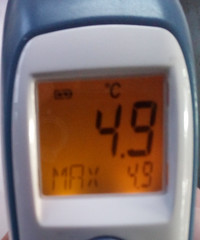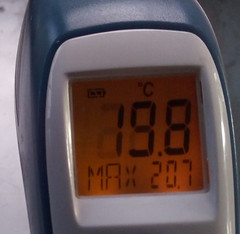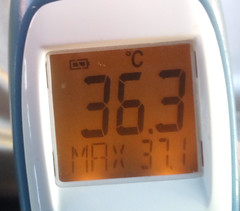So there is an idea that you need an massive battery bank in order to run an Electric Heater. But you do not!
I thought I would do another section to this Thread - "
Solar Hot Water Heating".
Now you can do genuine Solar Hot Water heating, but it really means having the water heated directly by the heat of the sun, which is not really practical in a vehicle for any significant extent in the UK. What is usually meant by "Heated by Solar" or "Run by Solar" is run off batteries which are recharged by Solar Panels. It this possible in the UK though?
A few charts to show why the answer is yes I think ....

Here is a typical chart showing solar harvesting in the summer. I selected a couple of days to show the pattern
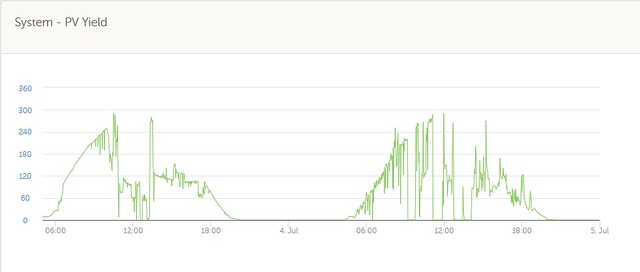 Solar Yield - Power Wave
Solar Yield - Power Wave by
David, on Flickr
You can see the energy yield ramping up as the sun rises; and then dropping off in the late afternoon.
But something odd is happening in the middle?

What is happening to the yield?
Well, when we look at the battery state we see it is pretty full
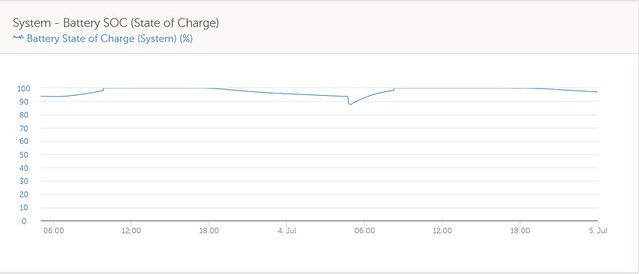 Solar Yield - SOC Match
Solar Yield - SOC Match by
David, on Flickr
And superimposing the Battery SOC chart on the Solar Yield chart, it is clear what is happening
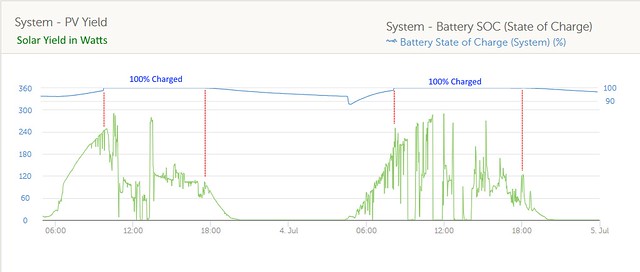 Solar Yield & SOC
Solar Yield & SOC by
David, on Flickr
Quite simply, the batteries are full by around 9:00-10:00 AM and there is no place for harvested energy to go. The peaks in solar between the red lines will be when power is called for and the solar contoller responds to provide extra power. but apart from those times, we basically have many hours of available energy wasted.
To take advantage of this, I have set the Victron BMV-712 to turn on its internal relay when the SOC hits 99% and then turn off when the SOC hits 94%
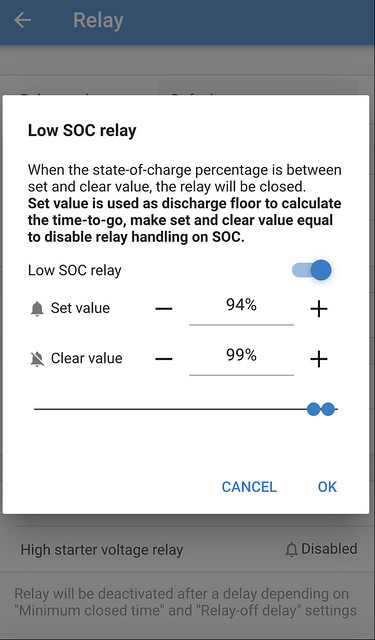 Victron BMV Relay Setting
Victron BMV Relay Setting by
David, on Flickr
I put the heater switch to position I - this is the 'activated by Relay' mode (position II bypasses the relay for direct control)
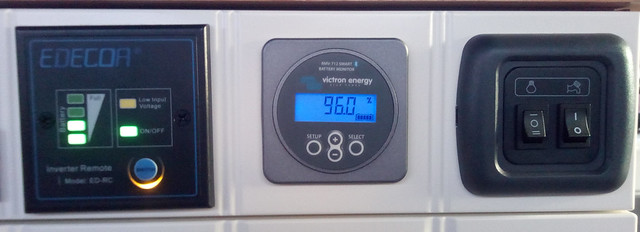 Control Bank
Control Bank by
David, on Flickr
How does this work in a typical summers day? This chart will illustrate showing the Battery SOC overlaid on the Power used by the heater
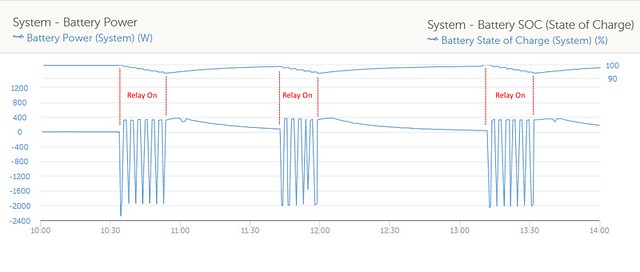 Sequential MeterControl - Battery Use and SOC
Sequential MeterControl - Battery Use and SOC by
David, on Flickr
As said, when the Battery hits 99% SOC, the relay turns on, which in turn starts the On-Off timer (described in an earlier post) and turns the heater on and off on a 60 second on/120 second off cycle. When the SOC has dropped down to 94% (as the heater uses more power than the solar can provide), the relay turns off, removing power from the On-Off timer and so turning the heater off. Omce the heater is off, the Battery SOC will start to rise again as the Solar Panels provide charge until the SOC again hits 99% and the process starts again.
The chart above shows this pattern between the hours of 10AM to 2PM and would continue throughout the day until the time the SOC does not rise back to 99% to kick off the next cycle.
This is what the Charger States are doing during this process
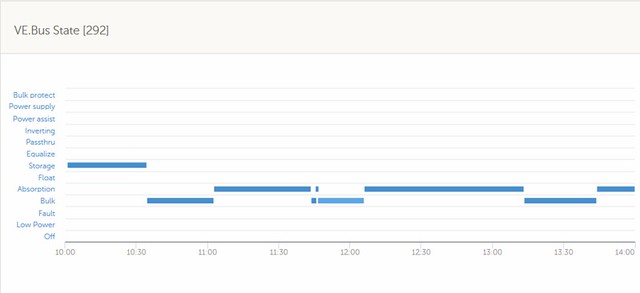 Sequential MeterControl - Charging State
Sequential MeterControl - Charging State by
David, on Flickr
( the batteries were fully charged when I put the switch onto position 1 to start the process to capture the data, hence why the initial status is 'storage')
The charging pattern show is for my AGM Battery install. Different batteries and battery bank sizes will result in a different timeline but the basic pattern will be as shown unless you have Lithium, where where is no Absorption or Float phase, just a Charge phase.
How well is the water heated? The results will vary depending on various factors (the bigger the battery bank and the bigger the solar bank, the longer it will be on as the SOC will take longer to drop to 94%; the bigger the Hot Water tank, the longer it will take to raise each degree in temperture), but these are the results for my 10L Water Tank for the cycle shown in the charts above in my test mode (I am using an AC charger to act as the Solar Charger which is why I selected 10AM to 2PM as my test times as that represents Peak Solar in the day).
Starting Temp
Interim
Last Temp
Each run added around 15C to the Water Temp. In the summertime, the water temp would start significantly warmer than 5 Celcius of course, so not many heating cycles will be needed to get very hot water.
I think the above shows how heating water can be a very effective use of Solar energy that would be otherwise wasted (see the very first chart again as a reminder of what usually happens to the solar power when you have a full battery)
For those interested, this is the block diagram for the Electric Hot Water System as installed in my Camper
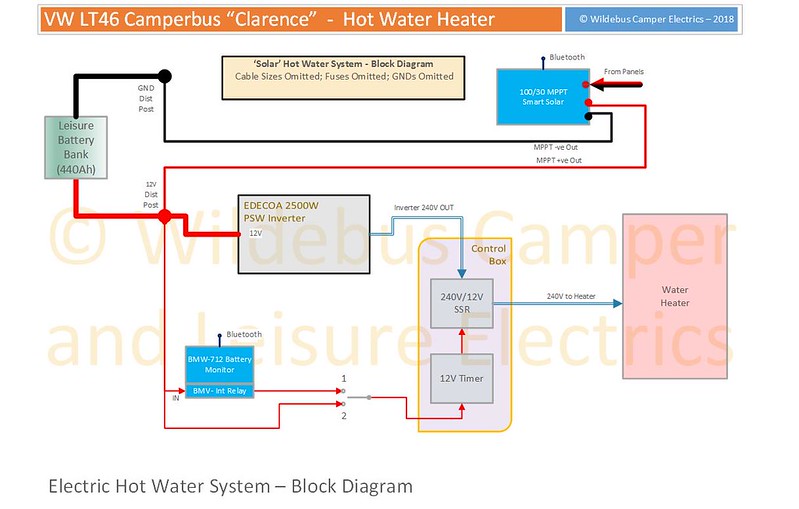
Clarence - Hot Water System by
David, on Flickr
I think this will probably be the last update


 Solar Yield - Power Wave
Solar Yield - Power Wave Solar Yield - SOC Match
Solar Yield - SOC Match Solar Yield & SOC
Solar Yield & SOC Victron BMV Relay Setting
Victron BMV Relay Setting Control Bank
Control Bank Sequential MeterControl - Battery Use and SOC
Sequential MeterControl - Battery Use and SOC Sequential MeterControl - Charging State
Sequential MeterControl - Charging State